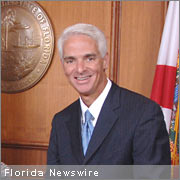ORLANDO, Fla. /Florida Newswire/ -– Governor Charlie Crist today, continuing his commitment to increasing energy efficiency and reducing greenhouse gas emissions, signed House Bill 167, sponsored by Representative Joseph Abruzzo, Representative John Tobia, Senator Eleanor Sobel and Senator Carey Baker. The legislation creates a rebate program that helps make energy-efficient appliances more affordable.
 “Today I am proud to sign legislation that will benefit consumers and businesses while increasing Florida’s reputation as a national leader in environmental stewardship,†said Governor Crist. “This rebate program will help Floridians buy appliances at discount rates, lower utility costs and benefit Florida businesses by stimulating sales of energy-efficient appliances.â€
“Today I am proud to sign legislation that will benefit consumers and businesses while increasing Florida’s reputation as a national leader in environmental stewardship,†said Governor Crist. “This rebate program will help Floridians buy appliances at discount rates, lower utility costs and benefit Florida businesses by stimulating sales of energy-efficient appliances.â€
House Bill 167 enables the Florida Energy and Climate Commission (FECC) to develop and manage the Energy-efficient Appliance Rebate Program, a consumer rebate program for residential energy-efficient appliances. The FECC will adopt guidelines, consistent with federal regulations, designating eligible appliances, rebate amounts and the process for issuing rebates.
The FECC estimates Florida will be eligible to receive at least $18 million in federal funds to implement the rebate program. The Florida Legislature also allocated appropriated $150,000 for Fiscal Year 2009-10 to the FECC for the purpose of administering the rebate program.
Assuming average rebates of 20 percent, based on median consumer costs, Floridians can expect to save the following amounts on energy-efficient appliances:
$290 on refrigerators.
$200 on clothes washers.
$200 on freezers.
$200 on dishwashers.
$65 on room air conditioners.
$40 on humidifiers.
Prior to the bill signing, Governor Crist visited the new Orlando corporate headquarters of Darden Restaurants Inc., where he praised the company for their efforts to achieve Leadership in Energy and Environmental Design (LEED) certification. According to Darden, their new corporate headquarters consists of a three-story restaurant support center of approximately 450,000 square feet, which will be capable of supporting more than 1,500 corporate employees. The support center includes a 30,000-square-foot culinary development center; a 25,000-square-foot training center; an onsite dining facility; a fitness and wellness center; a company store and bank branch, along with a 17,000-square-foot data center.
Darden plans to implement green components for its new headquarters, including reused water for irrigation; a highly reflective roof system; high efficiency HVAC chillers; and an open workspace plan to maximize use of natural light. According to Trammell Crow Company, the company constructing Darden’s new headquarters, the facility will be the largest office building constructed in Orlando in the last decade.
Restaurants owned and operated by Darden Restaurants Inc. include well known chains such as Red Lobster, Olive Garden and LongHorn Steakhouse. With more than 200 restaurants and corporate headquarters in Florida, Darden Restaurants Inc. employs more than 20,000 people. Ten of Darden’s 70 new restaurants opened this fiscal year are located in Florida.
The Energy-efficient Appliance Rebate Program builds on Governor Crist’s past energy and climate change initiatives. In 2007, Governor Crist signed three executive orders to reduce Florida’s greenhouse gas emissions, increase energy efficiency, and remove market barriers for renewable energy technologies such as solar and wind energy. In 2008, he signed the 2008 Energy and Economic Development Legislation, aimed at reducing greenhouse gas emissions, increasing energy efficiency and encouraging investment in alternative and renewable energy technologies. Among its requirements, this comprehensive, bipartisan legislation authorizes the development of a cap-and-trade regulatory program; creates a renewable fuel standard; and creates the Florida Energy & Climate Commission as a central office for state energy and climate change programs and policies.
For more information on Florida’s energy and climate change initiatives, please visit www.MyFloridaClimate.com .
